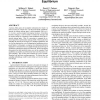294 search results - page 7 / 59 » The complexity of computing a Nash equilibrium |
ATAL
2006
Springer
15 years 5 months ago
2006
Springer
We present a technique for reducing a normal-form (aka. (bi)matrix) game, O, to a smaller normal-form game, R, for the purpose of computing a Nash equilibrium. This is done by com...
110
click to vote
AMEC
2003
Springer
15 years 6 months ago
2003
Springer
Auctions define games of incomplete information for which it is often too hard to compute the exact Bayesian-Nash equilibrium. Instead, the infinite strategy space is often popu...
141
click to vote
JAIR
2011
14 years 4 months ago
2011
There has been significant recent interest in game theoretic approaches to security, with much of the recent research focused on utilizing the leader-follower Stackelberg game mo...
101
click to vote
FOCS
2007
IEEE
15 years 7 months ago
2007
IEEE
We present efficient approximation algorithms for finding Nash equilibria in anonymous games, that is, games in which the players utilities, though different, do not differentia...
118
click to vote
BROADNETS
2005
IEEE
15 years 3 months ago
2005
IEEE
— We present a game-theoretical model of a wireless communication system with multiple competing users sharing a multiaccess fading channel. With a specified capture rule and a ...

